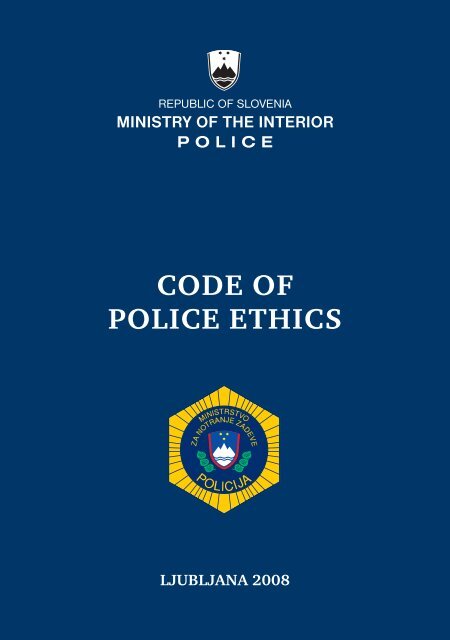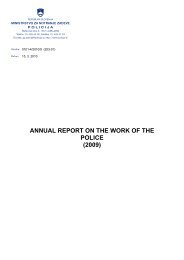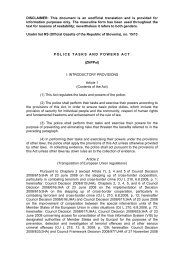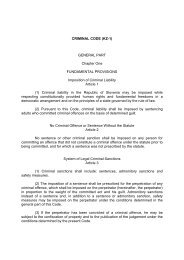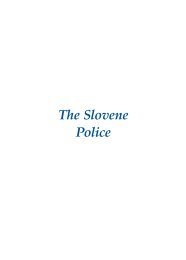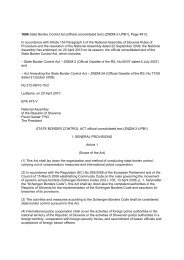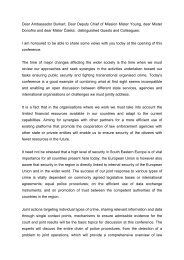Code of Police Ethics - Policija
Code of Police Ethics - Policija
Code of Police Ethics - Policija
- No tags were found...
You also want an ePaper? Increase the reach of your titles
YUMPU automatically turns print PDFs into web optimized ePapers that Google loves.
CODE OF POLICE ETHICSThe <strong>Code</strong> <strong>of</strong> <strong>Police</strong> <strong>Ethics</strong> consists <strong>of</strong> two generalprovisions and basic principles; it determinesboth the relations between police <strong>of</strong>ficers 1and the relations between police <strong>of</strong>ficers andcitizens, state authorities, non-governmentalorganisations and other institutions. The <strong>Code</strong><strong>of</strong> <strong>Police</strong> <strong>Ethics</strong> constitutes moral and ethicalstandards <strong>of</strong> the <strong>Police</strong> and upgrades the <strong>Code</strong> <strong>of</strong>Conduct for Civil Servants.The <strong>Code</strong> is intended to raise police <strong>of</strong>ficers’awareness <strong>of</strong> the importance <strong>of</strong> respecting ethicalprinciples and to strengthen ethical and moralconduct in practice.The <strong>Code</strong>’s Annex contains a list <strong>of</strong> values andvirtues expressing the mission <strong>of</strong> the <strong>Police</strong>.1The term police <strong>of</strong>ficer(s) applies to both female and malepersons.1
GENERAL PROVISIONSArticle 1The <strong>Code</strong> <strong>of</strong> <strong>Police</strong> <strong>Ethics</strong> expresses the will anddesire <strong>of</strong> all Slovenian police <strong>of</strong>ficers for lawful,pr<strong>of</strong>essional, fair, polite and correct work as wellas humane conduct.Article 2<strong>Police</strong> <strong>of</strong>ficers shall be committed to ensure theprotection <strong>of</strong> and respect for human rights andfundamental freedoms. In a lawful interferencewith an individual’s human rights andfundamental freedoms, they shall respect theperson’s personality and dignity.<strong>Police</strong> <strong>of</strong>ficers shall be obliged to protect a person’spersonality and dignity also by preventing anyviolence, inhumane treatment or other actionswhich are humiliating to people.<strong>Police</strong> <strong>of</strong>ficers shall perform their mission withthe force <strong>of</strong> argument rather than the argument<strong>of</strong> force.2
BASIC PRINCIPLESRespect for equality before the lawArticle 3<strong>Police</strong> <strong>of</strong>ficers, in their procedures, shall ensurethat everyone is guaranteed equal human rightsand fundamental freedoms, irrespective <strong>of</strong> ethnicity,race, gender, language, religion, political orother conviction, material standing, education,social status or any other personal circumstance.Protection <strong>of</strong> reputationArticle 4<strong>Police</strong> <strong>of</strong>ficers, in performing their work and intheir private life, shall ensure the protection andpromotion <strong>of</strong> their own reputation and the reputation<strong>of</strong> the police organisation. <strong>Police</strong> <strong>of</strong>ficersshall focus especially on strengthening the integrity<strong>of</strong> the police organisation. In their work, police<strong>of</strong>ficers shall adhere to principles; they shallbe consistent, resolute, persistent, fair, pr<strong>of</strong>essional,and in contacting people, state authorities,non-governmental organisations and otherinstitutions, they shall be polite and correct.3
IncorruptibilityArticle 5<strong>Police</strong> <strong>of</strong>ficers shall not require, for themselves orfor any other person, any special privileges, andshall be insusceptible to all forms <strong>of</strong> corruption.Public nature <strong>of</strong> workArticle 6<strong>Police</strong> <strong>of</strong>ficers shall earn sympathy, reputationand respect <strong>of</strong> the general public by performingtheir duties in a public, legal, pr<strong>of</strong>essional, fair,polite and correct manner, and shall accept thepublic as a form <strong>of</strong> control over their work.Pr<strong>of</strong>essionalism and independenceArticle 7To achieve pr<strong>of</strong>essionalism in their work, police<strong>of</strong>ficers shall be adequately trained and shall receivepr<strong>of</strong>essional and advanced training, as wellas broaden their general knowledge and developspecific knowledge and skills necessary to perform<strong>of</strong>ficial duties.4
<strong>Police</strong> <strong>of</strong>ficers may associate in trade unions orpr<strong>of</strong>essional and other similar associations inthe country and abroad. Their pr<strong>of</strong>essional conductshould not be based on political convictionsand world-views.Protection <strong>of</strong> pr<strong>of</strong>essional secrecyArticle 8<strong>Police</strong> <strong>of</strong>ficers shall protect pr<strong>of</strong>essional secrecyand shall not use in an unauthorised manneror disclose data and information acquired inthe performance <strong>of</strong> <strong>of</strong>ficial duties. In the course<strong>of</strong> their work and in informing the public, theyshall be appropriately discreet.Mutual relationsArticle 9The relations between police <strong>of</strong>ficers shall bebased on mutual respect, mutual assistance andthe principles <strong>of</strong> solidarity, collegiality, toleranceand honesty, mutual trust and dignity, constructivecriticism and good communication.5
Their relations shall not be characterised by thephenomena <strong>of</strong> false solidarity, humiliation, underestimationand discrimination.<strong>Code</strong> complianceArticle 10<strong>Police</strong> <strong>of</strong>ficers shall be obliged to comply with thiscode, and shall therefore be well acquainted withit. They shall be aware <strong>of</strong> the moral responsibilityand moral consequences <strong>of</strong> any breach <strong>of</strong> the<strong>Code</strong>.Adopting and amending the <strong>Code</strong>Article 11The <strong>Code</strong> <strong>of</strong> <strong>Police</strong> <strong>Ethics</strong> shall be adopted andamended by the representative trade union <strong>of</strong>the <strong>Police</strong> and shall be subject to the approval <strong>of</strong>Director General <strong>of</strong> the <strong>Police</strong>.Amendments may be proposed by the representativetrade union and Director General <strong>of</strong> the<strong>Police</strong>.6
Final provisionsArticle 12The principles <strong>of</strong> the <strong>Code</strong> shall be observed in allsecurity situations equally.Article 13The provisions <strong>of</strong> the <strong>Code</strong> shall be included inpolice training programmes, as well as in pr<strong>of</strong>essionaland advanced training.Article 14The <strong>Code</strong> <strong>of</strong> <strong>Police</strong> <strong>Ethics</strong> shall enter into force onthe day <strong>of</strong> its adoption on 9 October 2008.7
VALUES AND VIRTUES EXPRESSINGTHE MISSION OF THE POLICEWE, THE POLICE OFFICERS:• SERVE THE PEOPLE• PROTECT HUMAN LIFE AND PROPERTY• PROTECT THE WEAK FROM THE STRONG• ENSURE THAT ALL PEOPLE ENJOYCONSTITUTIONAL AND LEGAL RIGHTSUNDER THE SAME CONDITIONS• HAVE A HIGH LEVEL OF INTEGRITY• SEPARATE PERSONAL MATTERS FROMOFFICIAL ONES• ARE BRAVE AND RESOLUTE EVEN WHEN LIFEIS IN DANGER• ARE AWARE THAT THE POLICE IDENTITYCARD REPRESENTS RESPONSIBILITY ANDPUBLIC CONFIDENCE IN THE POLICE• PRESERVE CONFIDENTIALITY AND DO NOTABUSE DATA AND INFORMATION• ALWAYS ACT IN AN ETHICAL, LAWFUL ANDPROFESSIONAL MANNER


